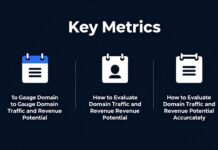Are you curious about tapping into the hidden value of expired domains? Before you dive in and make a purchase, it’s essential to understand how to effectively research these digital assets. The right strategies can help you uncover domains that are not only valuable but also have the potential to boost your SEO and drive traffic. So, what exactly should you look for when evaluating expired domains?
In this article, we will guide you through the critical steps to research expired domains before buying. You’ll learn how to analyze factors like domain authority, backlink profiles, and historical performance. These metrics are crucial in identifying domains with a strong foundation that can help your website rank higher in search engines. Have you ever wondered how some websites seem to skyrocket in traffic overnight? Often, it’s because they’ve strategically acquired high-quality expired domains that come with a history of authority and relevance.
Additionally, we will explore tools and resources that can simplify your research process, making it easier to find the perfect expired domain for your needs. Whether you’re looking to enhance your SEO strategy, build a niche site, or even flip domains for profit, knowing how to research expired domains correctly can unlock a treasure trove of opportunities. Join us as we delve into the world of expired domains and discover how you can leverage them to gain a competitive edge in today’s digital landscape!
10 Essential Tools for Evaluating Expired Domains: Maximize Your Investment Potential
When it comes to diving into the world of expired domains, there’s a treasure trove of opportunities waiting to be found. Many investors got caught up in the rush to grab these assets, but not everyone knows how to properly evaluate them before making a purchase. That’s where the right tools comes into play. Knowing how to research expired domains before buying can unlock hidden value and maximize your investment potential. Let’s explore 10 essential tools that can help you in your quest.
1. Ahrefs
Ahrefs is one powerful tool that every domain investor should check out. It helps you analyze backlinks, keyword rankings, and even the overall health of a domain. With Ahrefs, you can find out how many backlinks a domain has, where they come from, and the domain’s authority score.
Pros:
- Comprehensive backlink analysis
- Keyword research capabilities
Cons:
- Can be pricey for beginners
- Learning curve exist
2. SEMrush
Another popular choice is SEMrush. It’s not just for SEO; it also great for evaluating expired domains. You can look at a domain’s traffic history, organic search positions, and even potential PPC advertising costs.
Pros:
- Detailed traffic analytics
- Robust keyword tracking
Cons:
- High subscription cost
- Sometimes overwhelming for new users
3. Moz
Moz’s tools are well-known for their domain authority metrics. If you’re trying to evaluate the potential of an expired domain, Moz can help you understand its ranking power.
Pros:
- User-friendly interface
- Good community support
Cons:
- Limited data compared to Ahrefs
- Some features require a paid subscription
4. Wayback Machine
This tool is a must-have for anyone looking to research expired domains. The Wayback Machine allows you to see what a domain used to look like. It’s great to uncover how the domain was used and if it had a good reputation or not.
Pros:
- Historical snapshots of websites
- Free to use
Cons:
- May not have every webpage archived
- Limited to visual content
5. DomainTools
DomainTools provides insight into domain ownership and history. This can be crucial when trying to verify the legitimacy of an expired domain.
Pros:
- Detailed WHOIS records
- Great for tracking domain history
Cons:
- Subscription fees can be high
- Interface can be confusing
6. Google Search Console
If you got access to a previous owner’s Search Console data, it can be invaluable. You can analyze previous traffic, impressions, and even penalties that might have affected the domain.
Pros:
- Direct data from Google
- Free for users
Cons:
- Access may not always be available
- Limited to data from the previous owner
7. Spamzilla
This tool specializes in finding expired domains that are spam-free. It helps users to filter out domains that might come with a bad reputation.
Pros:
- Focuses on quality domains
- Easy to use
Cons:
- Less comprehensive than other tools
- Limited features for free users
8. ExpiredDomains.net
This is a free resource that lists expired domains. You can filter by various metrics, including length, extension, and even backlinks. It’s a good place to start your search.
Pros:
- Completely free to use
- Extensive database of expired domains
Cons:
- Interface is outdated
- No in-depth analytics
9. NameBio
For those who love data and trends, NameBio is a great tool. It tracks domain sales and provides historical sales data, which can help you evaluate how much a similar expired domain might be worth.
Pros:
- Comprehensive sales data
- Free and paid options available
Cons:
- Limited features on the free version
- Requires time to analyze data
10. SimilarWeb
This tool allows you to view traffic estimates and sources for any active domain. If you can find a similar domain to the expired one you’re evaluating, this could give you insight into potential traffic.
Pros:
- Great for competitive analysis
- Offers both free and paid tiers
Cons:
- Free version has limitations
- Data accuracy may vary
When you’re planning to invest in expired domains, using the right tools can make a significant difference. Each of these tools offer unique insights and features that can streamline your research process. Embrace the process, and don’t rush into buying without doing your homework. With the right tools and a little patience, you can unlock hidden value and maximize your investment potential in the domain marketplace.
The Ultimate Checklist: What to Look for When Researching Expired Domains
When your thinking about investing in expired domains, it can be fun but also daunting. The potential for hidden value is great, but so is the risk of buying a domain that doesn’t worth anything. So, knowing how to research expired domains before buying is crucial. This ultimate checklist will help you navigate those murky waters and find the best opportunities in the domain marketplace, especially here in New York.
Understanding Expired Domains
Expired domains are websites that were once active but have not been renewed by their owners. They can come with some established traffic, backlinks, and SEO value, which make them attractive to buyers. But, not every expired domain is created equal; some might be filled with bad history, penalties, or spammy backlinks. You have to dig deep and do thorough research before you pull the trigger.
Key Factors to Consider
When reviewing expired domains, there are several key factors you should look for. Here’s a checklist to help you out:
Domain Authority (DA) and Page Authority (PA): These metrics from Moz give you insight into how well a domain can rank on search engines. A higher authority means a better chance of ranking.
Backlink Profile: Analyzing the links pointing to the domain is critical. Quality backlinks come from reputable sites boost the domain’s value. Tools like Ahrefs or SEMrush can help here.
Traffic History: Check if the domain had consistent traffic before it expired. Tools like Wayback Machine can help you see the historical content and traffic patterns.
Keyword Relevance: Ensure that the domain contains keywords that are relevant to your niche. This can enhance SEO ranking potential.
Spam Score: Higher spam scores indicate bad backlinks or questionable history which could be detrimental to your new website. Aim for a score of 1-7 on Moz’s scale.
Social Media Presence: Review any existing social media accounts linked to the domain. An engaged audience can be a huge asset.
Age of the Domain: Older domains tend to have more authority, but it also depends on their history.
Brandability: Is the domain catchy, easy to remember, and pronounceable? A good domain name can help in marketing efforts.
Tools for Researching Expired Domains
Here are some tools that can help you with your research:
- Ahrefs: Great for analyzing backlink profiles and keyword rankings.
- SEMrush: Useful for traffic analysis and SEO audits.
- Moz: Provides metrics like DA and PA.
- Wayback Machine: Allows you to view past versions of the website.
- ExpiredDomains.net: A popular site that lists expired domains along with their stats.
Steps for Researching Expired Domains
Start with a List: Create a list of expired domains that interest you. You can find them on domain auction sites or expired domain databases.
Evaluate Metrics: Run the domains through the tools mentioned above. Look closely at DA, PA, traffic history, and backlink profiles.
Check for Penalties: Use Google Search Console or other SEO tools to check if the domain has received any penalties. Penalties can kill your chances of ranking.
Analyze Competitors: Compare your prospective domain with competitors in your niche. How do their metrics stack up? This can give you a better idea of what you’re dealing with.
Consider Future Potential: Look beyond the current metrics. Can you see potential for growth in the domain? Does it align with your business goals?
Common Pitfalls to Avoid
When researching expired domains, there are common mistakes you should avoid:
Ignoring the Domain’s History: Just because a domain has good metrics doesn’t mean it was used for legitimate purposes. A check on its history is necessary.
Focusing Only on Metrics: While metrics are important, the overall brandability and relevance of the domain should not be overlooked.
Neglecting to Verify Ownership: Make sure the domain is truly expired and not in the redemption period. Domains in this phase can still be reclaimed by the original owners.
Rushing the Process: Take your time. Good domains can be rare, and hasty decisions can lead to regret.
In the bustling domain marketplace of New York, understanding how to research expired domains before buying can unlock significant hidden value for your online ventures. By following this checklist, leveraging the right tools, and avoiding common pitfalls, you can make informed decisions and potentially find a gem that boosts your online presence. Happy hunting!
Avoid Costly Mistakes: 7 Red Flags to Watch Out for in Expired Domains
Buying expired domains can be a tempting way to score a great online asset, but it’s not without risks. Many people doesn’t realize that these domains can come with hidden problems that may cost you a lot more than you bargained for. That’s why it’s crucial to learn how to research expired domains before buying them. In this article, we will explore seven red flags to look out for when you’re considering an expired domain, and how to unlock their hidden value.
The Importance of Researching Expired Domains
When it comes to expired domains, doing your homework is essential. You need to understand not just the potential benefits but also the pitfalls. Researching expired domains can help you identify valuable opportunities while avoiding costly mistakes.
7 Red Flags to Watch Out For in Expired Domains
Here’s a list of things that you should be careful about when examining expired domains:
Spammy Backlinks: Domains with a history of spammy backlinks can affect your site’s reputation. You can use tools like Ahrefs or Moz to analyze backlink profiles. If the domain has links from low-quality sites, it might not be worth your time.
Negative SEO History: Some domains may have been targeted for negative SEO attacks. If a domain has a history of receiving malicious links, it can be flagged by search engines, hurting your future rankings.
Poor Domain Authority: A low Domain Authority (DA) can indicate that a domain struggles to rank well in search engines. You should look for domains with a DA of at least 20 if you want to make a sound investment.
Previous Penalties: Check if the domain has been penalized by Google. You can do this by looking up the domain in Google’s Search Console or using other SEO tools. If it has a penalty, recovering can take a long time.
Trademark Issues: Always ensure that the domain doesn’t infringe on any trademarks. If it does, you might end up in legal trouble, which can lead to costly lawsuits. You can search trademark databases to confirm.
Expired for a Reason: Sometimes domains expire because they were previously owned by businesses that failed. Investigate the history of the domain to make sure it wasn’t a red flag for a bad business model.
Lack of Historical Content: If the domain didn’t have any content or had very little, it might not be worth your investment. Use the Wayback Machine to see what was previously hosted on the domain.
How to Conduct Your Research
Now that you know what to look out for, let’s get into how you can research expired domains effectively. Here’s a simple outline to follow:
Use SEO Tools: Tools like SEMrush, Moz, and Ahrefs can provide a wealth of data about the domain you’re considering.
Check the Backlink Profile: Look at the quality of backlinks using the tools mentioned. Remove any sites that seem questionable.
Analyze Domain Authority: You can find the DA score on most SEO platforms. Higher scores typically indicate better potential.
Review Historical Data: Use the Wayback Machine to see past content and understand the domain’s journey.
Search for Penalties: Look for any history of Google penalties. If there’s a penalty, it can be a long road to recovery.
Trademark Searches: Visit trademark databases to ensure you are not stepping on anyone’s toes.
Assess the Market: Consider the demand for the niche related to the domain. If it’s a sought-after niche, it could lead to significant returns.
Practical Example of Researching an Expired Domain
Let’s say you’re interested in a domain like “BestCoffeeBeans.com”. Here’s how you might go about researching it:
Backlinks: You find that 30% of its backlinks come from coffee blogs, which are reputable. Good sign.
Domain Authority: The DA is at 25, which is decent for a niche site.
Historical Content: You check the Wayback Machine and see that it was active with regular content about coffee for five years before expiring.
Penalties: A quick search reveals no penalties associated with it.
Trademark Check: A quick look in the trademark database shows there are no existing trademarks on “Best Coffee Beans”.
Final Thoughts
Navigating the world of expired domains can be tricky. But with careful research and a keen eye for red flags, you can unlock hidden value that could significantly benefit your online presence. Always remember to take your time, conduct thorough checks, and don’t rush into any decisions. The right approach can lead you to find a diamond in the rough. Happy hunting!
How to Analyze Domain Authority: A Step-by-Step Guide to Expired Domains
When it comes to investing in expired domains, understanding domain authority is crucial for making smart choices. Domain authority, often abbreviated as DA, is a metric developed by Moz that predict how well a website will rank on search engines. Buying expired domains with high DA can unlock hidden value, but knowing how to analyze them is key. This guide will explore how to analyze domain authority and research expired domains before you invest.
What is Domain Authority?
Domain authority is a score that ranges from 1 to 100, assessing the strength of a domain’s ranking potential. Higher scores indicate a greater ability to rank well in search engines. Factors influencing DA include:
- Backlinks: The number and quality of links pointing to the domain.
- Content Quality: Relevant and valuable content that engages users.
- SEO History: Past performance regarding search engine optimization.
- Age of Domain: Older domains tend to have more authority.
Understanding these factors helps you make informed decisions about purchasing expired domains.
Steps to Analyze Domain Authority
Use a DA Checker: There are many tools available, like Moz’s Link Explorer or Ahrefs, that allow you to check a domain’s authority. Enter the expired domain into the tool and get its DA score.
Evaluate Backlink Profile: Look at the domain’s backlinks. A strong, diverse backlink profile is a good indicator of authority. You should aim for backlinks from reputable websites, as this boosts credibility.
Check for Spammy Links: Not all backlinks are beneficial. Use tools to identify spammy links that could harm the domain’s authority. Disavowing these links may be necessary.
Analyze Competitors: Compare the domain with competitors in the same niche. If a competitor has a much higher DA, it might be challenging to rank well.
Review Historical Data: Look into the domain’s history using tools like Wayback Machine. Checking what content was previously on the site could give insights into its past performance.
How to Research Expired Domains Before Buying
Researching expired domains involves several steps to ensure you’re making a wise investment. Here’s how to unlock their hidden value:
Check Domain History: Use tools like DomainTools to get a history of the domain. Understand if it was penalized by search engines or if it had any previous traffic.
Look at Traffic Metrics: Use tools like SEMrush to analyze past organic traffic. High traffic signals that the domain had value before expiration.
Investigate Niche Relevance: Make sure the domain aligns with your niche. A domain with a history in a relevant field will be more valuable for your purposes.
Assess Social Media Presence: Check if the domain had associated social media profiles. A strong social media presence can help in building authority.
Examples of Valuable Expired Domains
Let’s say you’re looking at expired domains in the tech industry. Here are some hypothetical examples:
| Domain Name | Domain Authority | Backlinks | Past Traffic |
|---|---|---|---|
| techinsights.com | 45 | 300 | 5,000/month |
| gadgetworld.com | 50 | 500 | 10,000/month |
| innovatetech.com | 60 | 600 | 8,000/month |
In this table, “gadgetworld.com” may be the best option based on its higher DA and traffic.
Common Mistakes to Avoid
When researching expired domains, there are some common pitfalls that investors should avoid:
Ignoring Domain Extensions: The extension (like .com, .net, etc.) matters. A .com domain is often perceived as more professional.
Overlooking SEO Metrics: Focusing solely on DA without checking other metrics like Page Authority (PA) can lead to misinformed decisions.
Neglecting Legal Issues: Ensure the domain doesn’t have any legal disputes attached to it. This can be a red flag.
Rushing the Purchase: Take your time to analyze. Hasty decisions can lead to poor investments.
Final Thoughts
Analyzing domain authority and researching expired domains before buying is a multi-faceted process. Understanding what to look for in a domain can help you uncover tremendous value that others might overlook. Remember to check the DA, evaluate backlinks, and investigate the domain’s history thoroughly. With careful analysis, you can find expired domains that not only fit your niche but also enhance your online presence. Happy hunting!
Unlocking SEO Benefits: Why Expired Domains Can Boost Your Online Presence
Unlocking SEO Benefits: Why Expired Domains Can Boost Your Online Presence
In the digital world, the race for visibility is intense, and every advantage counts. One often overlooked strategy is using expired domains. These domains, once owned and used for various purposes, can be a goldmine for boosting your online presence. Many people don’t realize that expired domains can offer significant SEO benefits, which is something that savvy marketers are starting to tap into. But why are they so valuable? And how do you research them before making a purchase? Let’s dive in.
The SEO Advantages of Expired Domains
Expired domains can provide a number of benefits for improving your website’s search engine optimization (SEO) performance. Here’s some key advantages:
Established Backlinks: Many expired domains come with existing backlinks from reputable websites. This can give your new site a jumpstart in search engine rankings.
Domain Authority: If an expired domain has built a good reputation, it might have a high domain authority score. This can translate into better visibility in search results.
Brand Recognition: Some expired domains have name recognition or keyword relevance that can be advantageous. If the domain used to serve a popular site, it might already have traffic potential.
Redirecting Traffic: You can redirect the expired domain to your current site, capturing some of the traffic that used to visit the old site. This can help in building your audience quickly.
How to Research Expired Domains Before Buying: Unlock Hidden Value
Finding the right expired domain isn’t as simple as typing a few keywords into a search engine. There’s a bit of detective work involved to ensure that you’re getting a domain that will truly benefit your online presence. Here’s a checklist for researching expired domains:
Check Domain History: Use tools like Wayback Machine to see how the domain was used in the past. A domain with a spammy history might hurt your SEO efforts.
Assess Backlink Profile: Analyze the backlinks pointing to the domain using tools like Ahrefs or Moz. Look for quality links from reputable sources rather than a bunch of low-quality links.
Domain Authority and Trust Flow: Check metrics like Domain Authority (DA) and Trust Flow to gauge the strength of the domain. Higher scores are generally better.
Keyword Relevance: Ensure that the domain name includes keywords relevant to your business or niche. A keyword-rich domain can help with SEO.
Avoid Penalties: Make sure the domain isn’t penalized by Google. You can check this through various SEO audit tools.
Social Media Presence: If applicable, see if the domain had associated social media accounts and whether they still hold value or followers.
Quick Tips for Hunting Expired Domains
- Use domain auction sites like GoDaddy Auctions or SnapNames to find expired domains.
- Set up alerts for domains that may expire in your niche.
- Join online forums or communities where domain names are discussed.
Comparison of Tools for Researching Expired Domains
Here’s a quick table to compare some popular tools for researching expired domains:
| Tool Name | Key Features | Cost |
|---|---|---|
| Ahrefs | Backlink analysis, keyword research | Subscription fee |
| Moz | Domain authority, link metrics | Subscription fee |
| SEMrush | Comprehensive SEO tools | Subscription fee |
| Wayback Machine | Historical snapshots of websites | Free |
| ExpiredDomains.net | Search for expired domains by niche | Free/Paid options |
Examples of Successful Expired Domain Use
Many businesses have successfully utilized expired domains. For instance:
- A travel blog that bought an expired domain related to travel tips saw a 150% increase in organic traffic within months.
- An e-commerce site purchased an expired domain that had a related product name, leading to a significant boost in sales.
When you look at these examples, it’s clear that with the right research and approach, expired domains can unlock hidden value and enhance your online presence.
The process of finding and acquiring expired domains may seem daunting, but the potential SEO benefits they can provide are undeniable. By understanding how to research them effectively, you can uncover opportunities that will propel your website to new heights. Whether you’re a seasoned marketer or just starting out, incorporating expired domains into your strategy might just be the game-changer you need. So, start your search today and see what hidden gems you can find in the world of expired domains!
Conclusion
In conclusion, researching expired domains before making a purchase is crucial to ensure that you invest wisely and maximize your online potential. Key steps include checking the domain’s history through tools like Wayback Machine, analyzing its backlink profile for quality and relevance, and verifying its SEO metrics using platforms like Moz or Ahrefs. Additionally, it’s essential to assess the domain’s current market value and consider its potential for future growth. By following these guidelines, you can avoid pitfalls such as investing in spammy domains or those with a tarnished reputation. Always remember to conduct thorough due diligence to make an informed decision. As you embark on your journey of acquiring an expired domain, take the time to research meticulously, and you’ll be well on your way to building a strong online presence. Start your search today, and unlock the hidden potential of expired domains!













